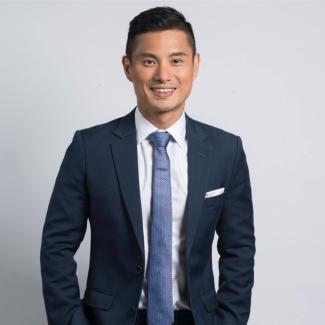
A teamwork misstep helped shape Josh Liaw’s philosophy of quiet, consistent leadership — now guiding a REIT through its next evolution.
The world of real estate investment is dynamic and multi-faceted — unlike other investment instruments, real estate’s value is heavily influenced by location-specific factors such as the local economy, population growth, and infrastructure development.
Josh Liaw understands this terrain well. As Chief Executive of Elite UK REIT, a Singapore-listed trust with assets across the United Kingdom, he guides the firm with a leadership style defined by quiet consistency – a style which he credits to painful lessons learned early.
His journey to the C-suite was a series of formative, often challenging placements that equipped him with a unique toolkit for navigating complexity. From an “unglamorous” start in finance to leading a UK-focused real estate investment trust, it was profoundly shaped by his foundational experiences at SMU, where he learned that the most valuable lessons arise from the messiness of human interaction and the courage to own one’s missteps.
The failure pivot
One of the most valuable lessons seared into Josh’s memory stems from a painful misstep during a group project.
He recalls: “Frustrated with teammates who weren't contributing to a group project, I hastily sent an email to the professor in an email naming and shaming them.
“Let’s just say it didn’t go down well. Tensions flared, the group imploded, and we limped to the finish line with inferior grades.”
Instead of brushing off the incident as a fleeting mistake, Josh chose to carry the lesson it offered. “That misstep taught me something lasting,” Josh says. “Leadership isn’t about calling people out. It’s about bringing people in.”
This principle has since shaped his career and now guides his stewardship of Elite UK REIT, a real estate investment trust focused on long-term value creation across the United Kingdom.
SMU’s unique pedagogical approach played a key role in shaping Josh’s leadership philosophy — particularly during the university’s formative years, which Josh likens to a start-up.
“If you wanted something done — an event, a new CCA or a school initiative, there was no committee to write to — you were the committee,” he recalls.
“We learnt to form teams, raise sponsorships, run events, and keep projects afloat while juggling coursework. Looking back, those experiences were my first lessons in leadership and ownership.”
This hands-on, entrepreneurial environment served to hone Josh’s resourcefulness and ability to take the initiative — skills that continue to serve him well even today.
A philosophy of consistency
SMU’s interactive and seminar-style approach also equipped Josh with practical skills for the real world. He says: “In industries like real estate and finance, where grey areas often outweigh clear cut answers, being trained to debate, question, and synthesise different perspectives was excellent preparation.
After graduation, Josh joined Citi’s competitive management associate programme. Eager to dive into deals and strategy, Josh was initially disappointed to be placed in the finance (accounting) team.
“It felt underwhelming at the time, and I seriously considered leaving at the end of the first week.”
Still, Josh stayed the course — and it gave him an in-depth understanding of financial processes, spreadsheet modelling and the financial mechanics that underpin each deal.
“That foundation has served me well ever since,” he reflects.
“It was a reminder that even the most unglamorous beginnings can set the stage — if you’re willing to learn.”
This willingness to embrace the essential work defined his early career. As a young banker, he faced the challenge of earning the trust of clients accustomed to seasoned veterans.
“Some preferred to deal with senior bankers and saw me more as an intern than a trusted adviser,” he recounts.
Instead of being discouraged, he focused on impeccable execution. Thoughtful follow-ups, slide decks prepared ahead of schedule and consistent execution shifted perceptions over time.
“Trust, I learnt, isn’t won in grand gestures; it’s built in the small things done well, repeatedly.”
Trust, I learnt, isn’t won in grand gestures; it’s built in the small things done well, repeatedly.”
Eyes on the prize
Today, at the helm of Elite UK REIT, Josh applies those same principles to a larger canvas. What began as a trust focused primarily on UK government-leased offices is now broadening its reach. Under his leadership, the Singapore-listed REIT has expanded into living sector assets such as student housing – in a strategic move to increase resilience in its portfolio.


“We have to be fluent in two timeframes,” Josh says. “Short-term, we focus on moving the needle: lease renewals, planning applications and capital management. But we’re also laying foundations for the future.
“That’s not an immediate win — it’ll take a few years — but the future arrives fast if you’re not planning for it.
One of the most ambitious moves it has made to date is the repositioning of Peel Park in Blackpool, a 16-hectare tech campus that the REIT plans to transform into a hyperscale, AI-enabled data centre.
This is where his steady style shows: no fanfare, no inflated promises — just a clear commitment to making the groundwork count.
More than bricks and mortar
But for Josh, real estate is never just about returns. The REIT’s core assets include Jobcentres — which provide an essential community that anchors employment and support. It’s a detail that matters to him.
“It’s the ‘S’ in ESG, lived out in bricks and mortar,” he says. “If we can deliver strong financial performance and social good, that’s the kind of legacy I’d be proud to leave behind.”
If we can deliver strong financial performance and social good, that’s the kind of legacy I’d be proud to leave behind.”
That dual focus — impact and performance — is part of the legacy he hopes to leave. Not a signature tower or flashy development, but a reputation for trustworthiness, consistency, and purpose.
“People respond to people, not titles,” he says. “At the end of the day, everyone wants to be understood — not impressed.”
It’s a clarity that doesn’t arrive fully formed. It’s earned — through false starts, quiet wins, and the discipline of showing up. One measured step at a time.
The SMU Edge
As Chief Executive of Elite UK REIT, Josh Liaw has steered the trust through a significant strategic evolution. At the core of this journey is a skillset that was honed during his time at SMU:
Applying theory to practice
SMU’s seminar-style classes trains students to go beyond rote memorisation. By challenging what they are taught, students learn to debate, question and synthesise perspectives, which serves to prepare them for the day-to-day decisions of working in the real world.
Taking ownership of your experience
The culture of SMU was — and remains — one grounded in building initiative and resourcefulness. Students have an abundance of opportunities to take the lead on running events and can actively be part of various community-centred initiatives. The opportunity is there, as long as you step up to seize it.